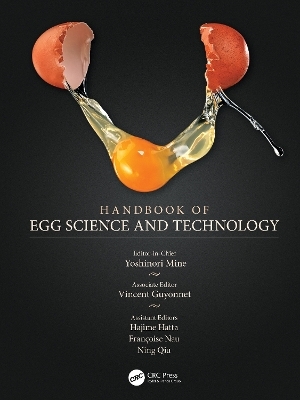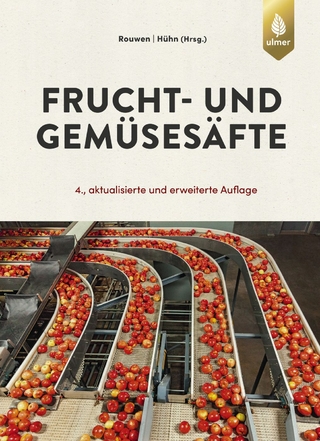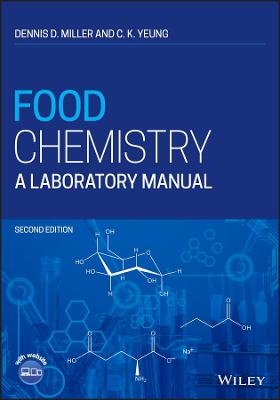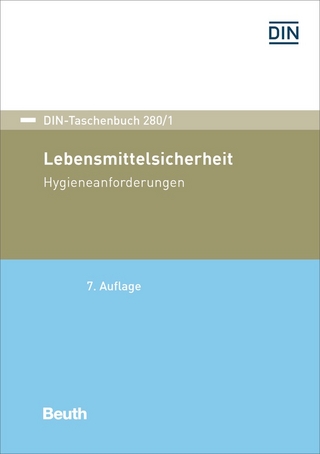
Handbook of Egg Science and Technology
CRC Press (Verlag)
978-1-032-15660-6 (ISBN)
Eggs are one of the most popular foods worldwide due to their great taste and versatility, economical value and high nutritional content. The egg plays an important role in the human diet, both for the nutritional value of its many components (e.g., proteins, vitamins, minerals, choline, specific long chain fatty acids) as well for its wide range of functional characteristics, including foaming, gelling and emulsifying properties. The egg sector is a vibrant field with many new developments in terms of production, processing and commercialization as well as research. Since the beginning of the 21st century, the global production of eggs has grown by 69.5%, farm production systems have evolved to improve the welfare of laying hens, many eggshell and egg products have been developed to address the changing demands of consumers and our knowledge of the composition of the egg has been boosted by the latest gene-based technologies. Information on the science and technology of egg and egg processing is essential to governments, academia and industry.
The Handbook of Egg Science and Technology aims to be the first book providing a complete source of information about egg science and technology, covering topics such as world egg production, marketing of eggs, chemistry of egg components, functional properties of egg components, egg processing, egg product development, eggshell quality, grading, egg microbiology, egg pasteurization, egg nutrition and bioactive components, egg biotechnology and sustainability of egg production.
Features
Includes the most current and comprehensive scientific and technical information about egg science and technology
Presents an ideal guide for professionals in related food industries, egg business consultants, regulatory agencies and research groups
Answers the need for a comprehensive textbook for upper-level undergraduate and graduate courses in food science, animal science and poultry departments
A global panel of experts in the field of egg science was gathered with the aim to provide the most updated information and development on many topics likely to interest readers ranging from academia and food science students to managers working in the food production and egg processing sectors. This handbook is an excellent resource for the food and poultry industry, R&D sectors, as well as experts in the field of food and nutrition.
Prof. Yoshinori Mine (Editor) Dr. Yoshinori Mine earned his Ph.D. Biochemistry from Tokyo University of Agriculture and Technology in Japan in 1993. Dr. Mine joined the University of Guelph (Ontario, Canada) in 1996 as a faculty member at Department of Food Science. Currently, he is a full professor (since 2005). He is a recipient of PREA (The Premier’s Research Excellence Award) in 2000 and American Egg Board Research award in 2005. Dr. Mine is also an Associate Editor for Journal of Agricultural and Food Chemistry journal (ACS publications) since 2010 and serving on editorial advisory board member of international journals of J. Functional Foods, Food Biosci., Int. J. Food Sci. Tech., and Nature-Sci. of Food. He is also actively involved in numerous international food and health related symposiums as an invited speaker and advisor of food and health ingredient companies. Dr. Mine’s primary research focus is molecular approaches to the study of structure-function relationships of bioactive proteins/peptides and egg allergy, to enhance human intestinal health. His group is exploring novel approaches to cure chronic oxidative stress and inflammation using dietary peptides, amino acids and pro-/prebiotics as well as understanding mechanism of actions of food factors-gene interactions. Recently, his group has demonstrated a new proof of concept of long-term low grade chronic inflammation and potential risk of metabolic disorders. This impacts to microbiota and signaling molecules. He has published 5 books, 37 book chapters, 15 review articles, 162 original papers to the peer-reviewed international journals. Prof. Hajime Hatta, Ph.D. (Associate editor) After graduating from Osaka City University with a degree in biology, Hajime Hatta has researched hen’s egg for almost 40 years. This experience includes working for the egg processing company, Taiyo Kagaku Co., Ltd, for 18 years. While working in R & D for Taiyo, he studied food science at Kyoto University and The University of British Columbia for three years. After gaining valuable experience at these universities, he became interested in researching egg yolk antibodies (IgY). He then organized an IgY project funded by the Japanese Science and Technology Agency for five years, beginning in 1991. Several specific-IgY fortified foods and feeds to prevent dental caries or fish diseases were developed for the first time in the world through this IgY project. From his work on this project, he was given awards in Technological Research for Industrial Applications of IgY from the Japanese Association for Bioscience, Biotechnology, and Agro-chemistry in 1994. Afterward, he got an academic position at Kyoto Women’s University in 1998. In addition, he established the Japanese Egg Science Forum in 2003. The forum has been held annually in Kyoto Women’s University and hosts about 300 delegates involved in egg research and the egg industry. In recent years, he has been enjoying teaching food science and researching egg yolk IgY and the functionalities of egg in foods. Dr. Vincent Guyonnet, DVM, Ph.D, Dipl. ACPV (Associate editor) Vincent Guyonnet obtained his DVM degree from Lyon, France (1987) and his Ph.D degree in Poultry Science from The University of Georgia, USA (1991). During his career, Vincent has worked closely with the Poultry sector, first from the Animal Health side and then from the production and food processing side. Concurrently, he has represented the global Poultry & Egg sectors with intergovernmental organizations (OIE, FAO, World Bank) to address global issues such as animal welfare, climate change, and the overall sustainability of animal production. Vincent has taught on various topics related to egg production and is currently a lecturer with the World Veterinary Education in Production Animal Health (Luxembourg) and the Ly Ja Poultry School (China). Vincent has authored 4 book chapters, 13 refereed articles, presented at 45 international scientific conferences, often as an invited speaker, and writes regularly editorials for international Poultry magazines. Prof. Françoise NAU (Associate editor) Agronomist (graduated in 1986) and PhD in agronomic sciences (graduated in 1991), I am Professor in Food Science at Agrocampus Ouest (Rennes, France) which is an “elite public university-level college” for life and environmental sciences and technologies, with training and research activities ranging from food production to landscape architecture. After 3 years in research and development for private companies (pharmaceutical and egg product industry), I was recruited as assistant professor in 1993, and got a professor position in 2003. Since 2016, I am the head of the department of Animal Science, Food Science and Nutrition of Agrocampus Ouest. My teaching areas are physico-chemistry and food science and technology, including a special focus on ingredient functionalities and egg and dairy science. My research activity is incorporated within the framework of the general pattern of the UMR1253 INRAE-Institut Agro “Dairy and egg science and technology”. My area of expertise is protein physico-chemistry, and for 15 years, I specifically worked on functional properties and fractionation of egg white proteins. Since 2010, I am particularly interested in the understanding of digestion process in relationship with food processing and food structure and texture on one hand, and in protein biofunctionality (mainly antimicrobial properties of egg white proteins and peptides). Prof. Ning Qiu, Ph.D. (Associate Editor) Dr. Ning Qiu’s research areas include application of quantitative proteomics to investigate avian egg protein nutrition and functions and modulation of gut microbiota influenced by egg proteins. He obtained his Bachelor’s Degree in Bioengineering from Jiangnan University in 2000 and a PhD in Microbiology from Huazhong Agricultural University in 2010. Currently, he is an Associate Professor at Huazhong Agricultural University. He has a number of honors and scientific publications to his credit including Advisor for Monitoring and Analysis of Egg Processing Industry (Ministry of Agriculture of China), Member of Youth Committee of National R&D System for Agricultural Products Processing Technology, External Enterprise Tutor of CP Group, etc.
PART I. 1. Introduction. 2. World egg production and marketing trends PART II. 3. Egg biosynthesis, structure and general composition. 4. Eggshell and membranes. 5. Egg White. 6. Egg yolk constituents and structures. 7. Egg pigments, minerals, enzymes and vitamins PART III. 8. Egg white protein functionality. 9. Egg yolk lipid and protein funtionality PART IV. 10. Egg processing plant design- From shell eggs to liquid and powder egg products. 11. Eggshell calcium. 12. Application of eggs in food product development. 13. Traditional egg and egg products. 14. Innovative strategy to new egg product development PART V. 15. Egg shell and yolk colour. 16. Measurement of shell egg quality. 17. Shelf-life of eggs. 18. Regulations for shell eggs in different countries PART VI. 19. Egg proteomics and egg quality. 20. Microbiology of egg and egg products PART VII. 21. Egg shell membrane. 22. Bioactives of egg white proteins and peptides. 23. Egg yolk proteins and peptides. 24. Egg bioactives and chronic degenerative diseases. 25. Egg yolk lipids. 26. Lysozyme-anti-microbial agent and applications. 27. Egg yolk antibody-Igy. 28. Minor components of egg PART VIII. 29. Nutritional facts about eggs. 30. Egg Consumption and Cardiovascular Disease. 31. Egg allergy. 32. Dietary egg and chronic diseases-prevention of metabolic disorders. 33.Effect of dietary eggs on microbiota. 34. Egg and sport nutrition. 35. Egg and bone health. 36. Egg and brain health. 37. Egg carotenoid and eye health. 38. Evidence- based nutrition-fortified eggs- omega-3 egg, folate egg, lutein egg, VD egg, etc. PART IX. 39. Genome editing and its application to egg biotechnology. 40. Ex-ovo culture system of egg. 41. Egg and embryonic development PART X. 42.The sustainability of the egg sector- Opportunities and mitigation strategies. 43. List of key resources in the egg sector
| Erscheinungsdatum | 14.09.2023 |
|---|---|
| Zusatzinfo | 138 Tables, black and white; 35 Line drawings, color; 119 Line drawings, black and white; 34 Halftones, color; 61 Halftones, black and white; 69 Illustrations, color; 180 Illustrations, black and white |
| Verlagsort | London |
| Sprache | englisch |
| Maße | 210 x 280 mm |
| Gewicht | 2460 g |
| Themenwelt | Technik ► Lebensmitteltechnologie |
| ISBN-10 | 1-032-15660-0 / 1032156600 |
| ISBN-13 | 978-1-032-15660-6 / 9781032156606 |
| Zustand | Neuware |
| Haben Sie eine Frage zum Produkt? |
aus dem Bereich


